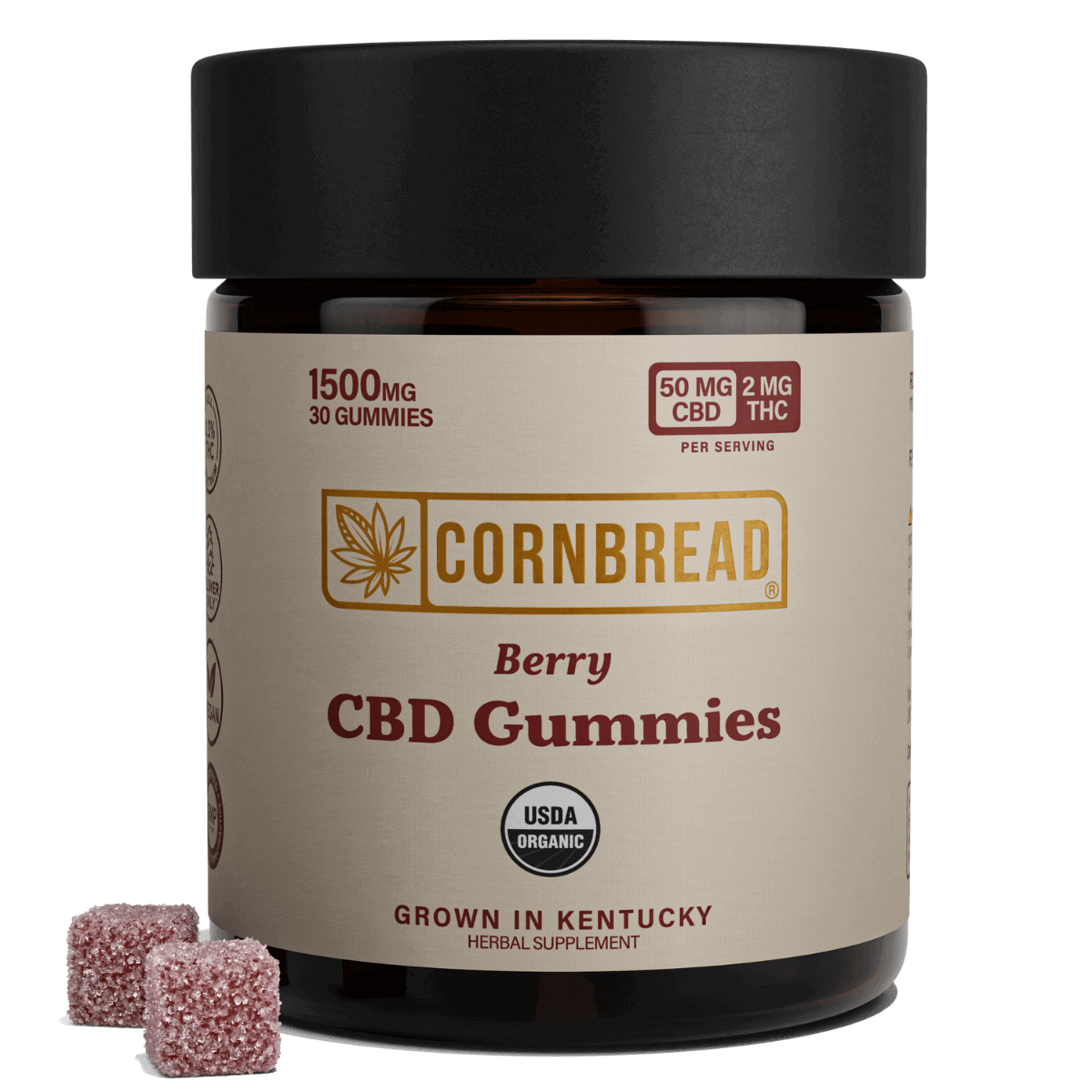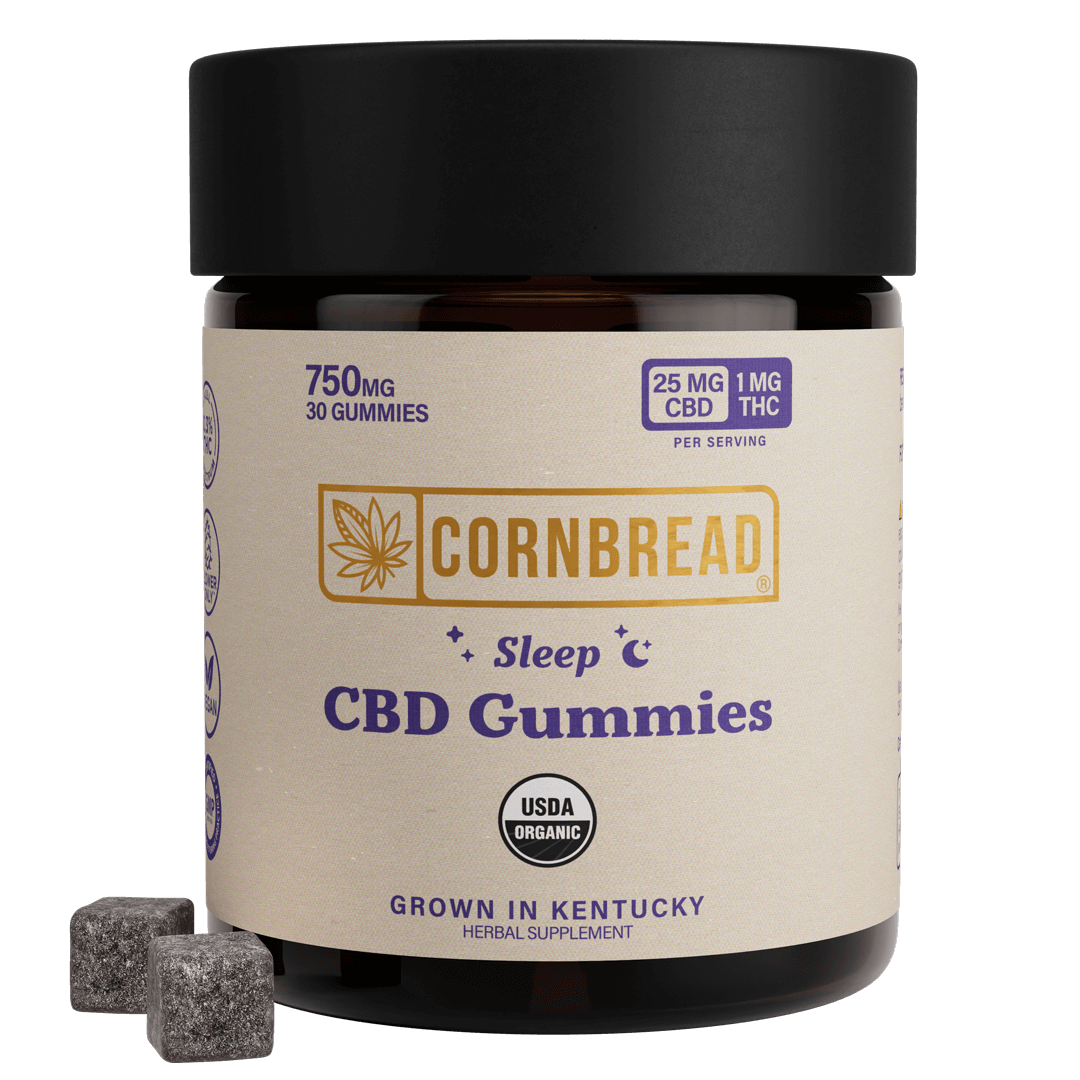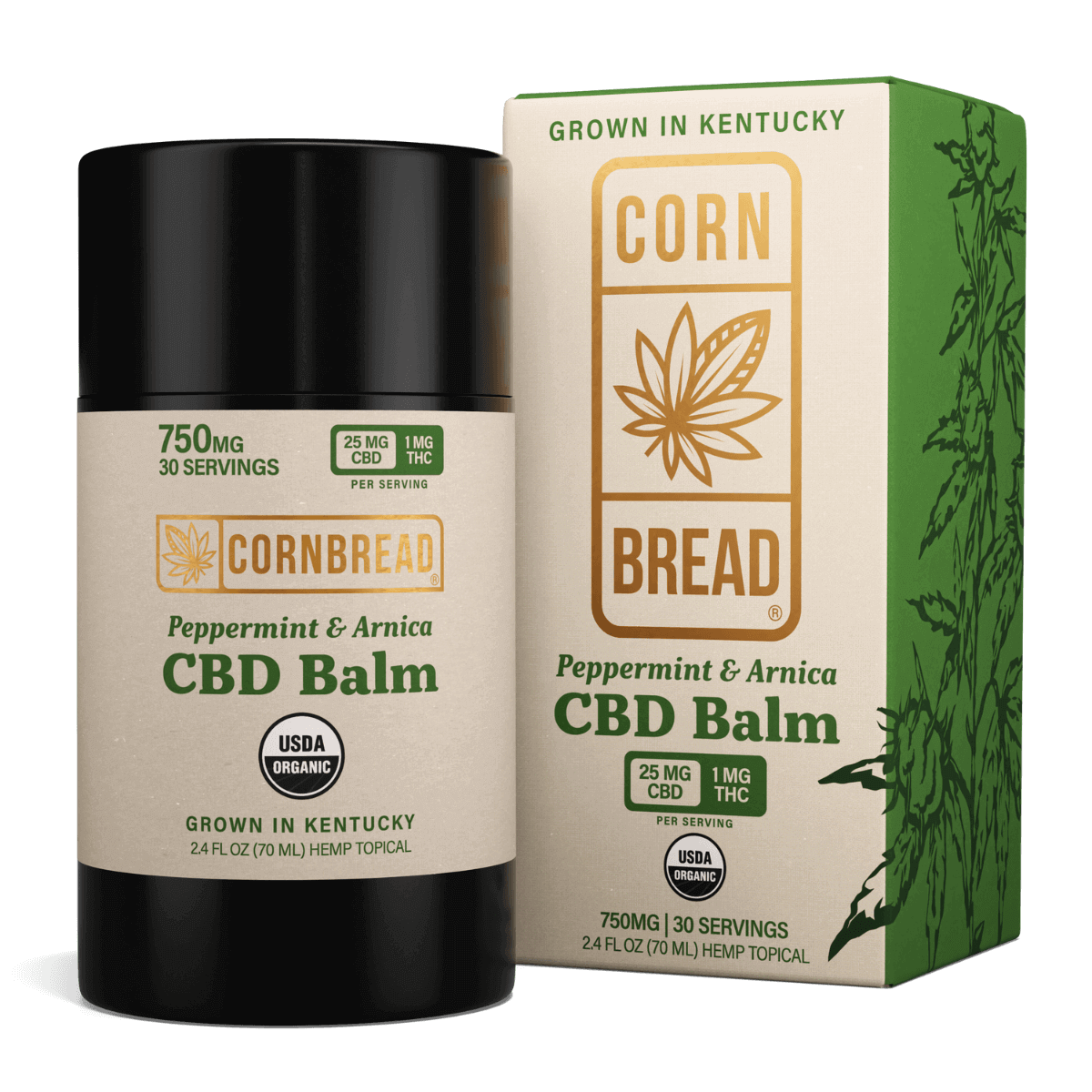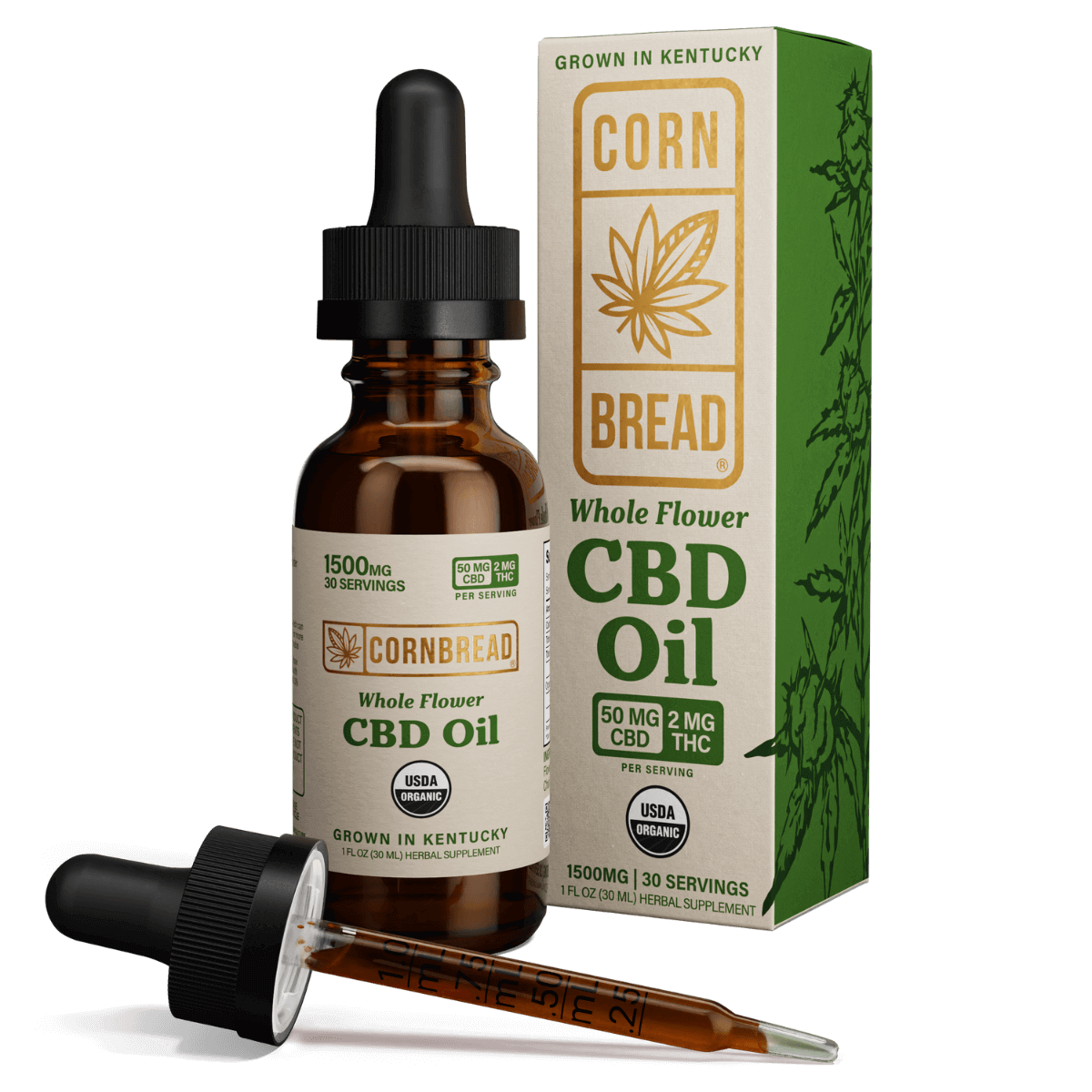Table of Contents
- Introduction
- How Does Your Body Process THC?
- How Long Does THC Stay in Your System?
- Factors That Affect How Long It Takes to Eliminate THC
- How Does a Drug Test Detect THC?
- THC Detection Window
- How Long Does THC From CBD Stay in the System?
- Alternatives to Marijuana and High-THC Supplements
- Low-THC CBD From Cornbread Hemp
Introduction
How long does THC stay in your system? With the growing legalization of marijuana, it’s a question on a lot of people’s minds these days. THC (Tetrahydrocannabinol) is the compound in Cannabis plants (most notably, marijuana) that gets you high. Though some states have legalized marijuana (at least in part), making THC use increasingly common among Americans, it’s still a controlled substance on a federal level and many companies subject their employees to drug tests and levy strict penalties on those who fail them.
But THC isn’t just found in marijuana — it’s also naturally present in hemp (another subspecies of the cannabis sativa plant). The amount of THC in hemp is low — no more than 0.3% — not enough to get you high, but it’s enough that some CBD users may also wonder whether or not THC will show up on a drug test.
So, how long does THC stay in your system? How long is the detection window for blood tests, hair follicle tests, or a urine drug test? Before you run out to buy a bunch of detox kits or synthetic urine, read on for answers to these questions and more.
How Does Your Body Process THC?
Whether you're smoking cannabis or ingesting a THC edible, the way you take THC will affect how THC is metabolized1 (processed or changed within the body) and, ultimately, how long THC stays in your system.
When THC is ingested (as a gummy, oil, tincture, or other edible), it travels through the digestive tract and then is either eliminated or metabolized (changed into metabolites) by the liver. More than 85% of THC and its metabolites are eliminated through waste matter, with about 20% leaving through the urine. Only 4%–12% of ingested THC is bioavailable (ends up in the bloodstream).
THC oils and tinctures that are held under the tongue before being swallowed will produce effects sooner than gummies and other edibles that must first be digested, but otherwise, the process is basically the same.
When THC is inhaled (smoked or vaped) a portion of the cannabinoid enters the bloodstream through the lungs. This happens almost immediately, which is why you’ll feel the effects of inhaled THC so much sooner than ingested THC. Eventually the liver will still process or eliminate much of the cannabinoid. At between 10% and 35%, the bioavailability (absorption) of inhaled THC is much greater than that of ingested THC.
Is THC Stored in Fat Cells?
Like all other cannabinoids, THC is lipophilic — which means it dissolves very easily into fat. Regardless of how THC is consumed, a portion of the cannabinoid will accumulate in the body’s fat tissues and, over time, continue to be released into the bloodstream and metabolized by the liver. The accumulation within the body’s fat stores is why it takes chronic cannabis users so much longer to eliminate THC from their systems.
THC could be detected in your system for as long as 90 days after you last used it, depending on a variety of factors:
-
Frequency of THC dose
-
THC potency or strength
-
Mode of consumption
-
Physical factors (metabolism, BMI)
-
The drug test being administered
How Long Does THC Stay in Your System?
As mentioned above, THC is quickly absorbed into the body’s fat tissues where it accumulates and is slowly released back into the bloodstream. This is why it takes so long to eliminate THC from your system.
It’s important to note that drug tests are able to discern prior use, not current use. Because different tests have different detection windows2 it’s possible for THC to be detected months after use. It’s also possible for THC to not show up on certain tests while it’s still in circulation within the body.
For these reasons, a better question might be, “How long is THC detectable within your system?” Depending on the type of drug test being administered, THC may be detectable for as little as 24 hours or as long as 6+ weeks.
Factors That Affect How Long It Takes to Eliminate THC
There are many factors that affect how long the drug remains in your system — from the amount and frequency of the THC consumed to your own unique physical and physiological traits. Below are the main factors to consider when determining how long THC might remain in your system.
Frequency of THC Dose and THC Half-Life
A half-life is the time it takes for a drug’s concentration level to reduce by half within the body. It takes about five half-lives for a substance to fully leave the body. Like every drug, THC has a half-life and the frequency of cannabis use greatly affects this half-life.3
For those who use THC occasionally, the half-life is 1.3 days. For those who use THC heavily, that number increases to between five and 13 days. Multiply those numbers by five and that’s how long THC will remain within the body.
Urine testing is the most commonly used for detecting marijuana metabolites and below you can see how much frequency of cannabis use affects the THC detection window of these tests.4
-
One-Time Use
If you’ve only taken THC once (or once in many months), it can be detectable in urine for up to three days after the time it was consumed.
-
Moderate Use (Four Times a Week)
If you’re using THC moderately (up to four times a week), it will continue to show up on urine tests for between five and seven days after your last use.
-
Regular Use (Seven Days a Week)
If you’re using THC every day, it can be detected in urine for between ten and 15 days after it was last consumed.
-
Heavy Use (Multiple Times a Day)
If you’re using THC chronically (multiple times per day), it can trigger a positive urine test for more than 30 days after you’ve ceased use.
THC Potency or Strength
THC is rarely taken in a pure form. Whether inhaled or ingested, the potency of the THC being consumed can vary greatly. For example, hemp-derived CBD will only contain up to 0.3% THC. This isn’t enough to create a high feeling, but it could be enough to trigger a positive drug test. Marijuana and marijuana-derived products and supplements will contain far more THC.
In order for THC to leave your system, all of the THC must be either metabolized or eliminated as waste. The more THC that’s in your system, the longer this will take.
Mode of Consumption
There are various ways to introduce THC to the body, but the two main modes are ingesting it and inhaling it. Regardless of how THC is consumed, it always results in the production of THC metabolites that can be detected through a urine test, blood test, saliva test, or hair follicle test. However, the way that you take THC will affect its bioavailability (how much THC ends up in the bloodstream), how quickly the THC takes effect, and how long the effects last.
-
Inhaled THC (Smoke or Vapor)
Inhaling THC results in markedly improved bioavailability, or absorption — between 10% and 35%. Because a portion of the THC is able to enter the bloodstream almost instantly through the lungs, the effects are felt very quickly, but they don’t last as long as effects from edible forms of THC.
-
Ingested THC (Edible)
THC oils, tinctures, gummies, and other edibles have a much lower bioavailability — between 4% and 12%, due to the large amount of THC lost during digestion, metabolism, and elimination. The effects from ingested THC are delayed since the cannabinoids have to pass through the liver before entering the bloodstream, but they do last longer — and may take longer to be eliminated from the body’s systems.
Metabolism
Metabolism plays a key role in eliminating THC from the system. If your metabolism is slow, THC will take longer to be converted into metabolites and released through your waste, remaining in your body for an extended period of time.
Body Mass Index
Fat stores cannabis compounds very efficiently. Since THC accumulates in the body’s fatty tissues, those with high levels of body fat may retain THC in their fat cells longer after they consume marijuana.
How Does a Drug Test Detect THC?
If you’re wondering how long THC stays in your system, it’s possible you have a drug test coming up. Drug tests can detect evidence of THC use as well as that of a variety of other substances. Sometimes, when one fails to pass a drug test, a second more precise test will be administered to confirm the results of the first.
What Are Drug Tests Looking for Specifically?
Drug tests for marijuana use are designed to detect THC and its metabolites. Marijuana and hemp (both subspecies of cannabis sativa) each contain over 100 different cannabinoids, but only a few of them are measured by these tests. Most of the time, drug tests are specifically looking for THC and THC metabolites; however, there are other drug tests made to detect cannabis compounds like CBD (cannabidiol) as well.
THC Detection Window
Chronic users of cannabis may wonder not only how long THC stays in the system but also how long marijuana will show up on a test. Whether or not you get a positive drug test depends on the type of drug test being administered, frequency of drug use, and the THC metabolite cut-off level for the particular test.
Below is a breakdown of the different types of tests and their THC detection windows:
How Long Can THC Be Detected in Urine Tests?
Urinalysis (or urine test) can detect cannabis metabolites for as few as three days and as long as 6 weeks (or more) after last use, depending on THC potency, frequency of use, and other factors. Urine tests are the most common type of drug test.
How Long Can THC Be Detected in an Oral Swab or Saliva Test?
Saliva tests have the shortest detection window. These tests can detect THC for up to 24 hours after last use. However, it’s possible that THC metabolites may be detectable for as long as 72 hours in the saliva of frequent users.5
How Long Can THC Be Detected in Blood Tests?
On average, blood tests can detect THC metabolites for up to seven days after it was last used. However, in the case of chronic daily use, THC metabolites may remain detectable via blood tests for a month or longer.6
How Long Can THC Be Detected in Hair Tests?
After consuming or inhaling THC, cannabinoids make their way to the hair follicles where they accumulate. Hair grows about 0.5 inches per month, so a hair test that analyzes 1.5 inches of hair retrieved close to the scalp can detect THC use over the past 90 days.7
How Long Does THC From CBD Stay in the System?
If you’re taking CBD, the amount of THC present is based on the type of CBD product you’re using. Hemp-derived CBD will contain no more than 0.3% THC, but some products have this cannabinoid removed (or mostly removed) during processing, resulting in trace or undetectable THC levels.
Full Spectrum CBD

Full spectrum CBD is made from hemp and includes all of the cannabis compounds found naturally in the plant, including 100+ cannabinoids, as well as terpenes and flavonoids (compounds responsible for the color, taste, and smell of cannabis).
Hemp, by definition, can contain no more than 0.3% THC and any hemp-derived CBD supplement is limited to this low level of THC. Full spectrum CBD is one of the most popular varieties because it has the potential to bring about the “entourage effect” — an increase in potential benefits of individual cannabinoids brought on by the presence of other cannabinoids. This effect has been largely attributed to the combination of CBD with THC, even in small amounts.
Broad Spectrum CBD
Broad Spectrum CBD is similar to full spectrum, as it contains an array of cannabinoids and other cannabis compounds. However, the spectrum of compounds is less varied, and the THC, specifically, has been removed or reduced to nearly undetectable levels. One is less likely to experience the entourage effect with a broad spectrum CBD than with full spectrum.
CBD Isolate
CBD isolate is a pure crystalline form of CBD that contains no other cannabinoid or cannabis compounds. It can be used to make a variety of CBD products, including oils, salves, and edibles. It contains zero THC. As CBD isolate contains only CBD, it will not produce the entourage effect.
How Long Does 0.3% THC Stay in Your System?
Hemp-derived cannabis products contain no more than 0.3% THC, far less than the THC concentrations of marijuana and marijuana-derived products, which can be upwards of 15%. When it comes to one-time use of a cannabis product, low THC and high THC will have the same half-life. However, someone who consumed 0.3% THC gummies (versus 15% THC gummies) will achieve undetectable levels of THC metabolites in their system sooner and be less likely to fail a drug test.
What About Higher Concentrations of THC?
The half-life of THC is affected far more by frequency of use than by the amount of THC consumed at once. So, how long does 5 mg of THC stay in your system? How long does 10 mg of THC stay in your system? The answer is the same as it is for 1 mg of THC — it will take between 6.5 and 65 days for THC to be eliminated from your system, depending on how regularly you use it.
Alternatives to Marijuana and High-THC Supplements
People become regular cannabis users for a myriad of reasons. If you’re using THC products to relieve everyday aches and pains, improve your mood, or help with your sleep, you should know that CBD has the potential to produce all of these benefits as well, all while containing only a very small amount of THC, if any at all, depending on the type of CBD product you use.
If you’re worried about how long THC remains in your system because of the psychoactive effects of THC or because you’re subject to drug testing at work, switching to hemp-derived full spectrum CBD is a great option. You can dramatically reduce the risk of failing a drug test and avoid the uncomfortable psychological effects sometimes associated with THC, simply by replacing marijuana-derived cannabis products with those derived from hemp.
It’s important to note that all products containing THC (even those with very low THC concentrations) have the potential to trigger a positive test result. Check out our article, Does CBD Show Up on a Drug Test?, for more information on this subject.
Low-THC CBD From Cornbread Hemp

When choosing a CBD supplement, it’s important to have confidence in the quality and content of that product. Cornbread Hemp offers low-THC, full spectrum CBD supplements derived from the whole flower only. We also provide a certificate of analysis (COA), which details the exact cannabinoid content for each product. Every CBD supplement at Cornbread Hemp — from CBD oils and CBD gummies to CBD lotions and CBD balms — is USDA-certified organic through every step of the process. Shop Cornbread Hemp CBD products now.









